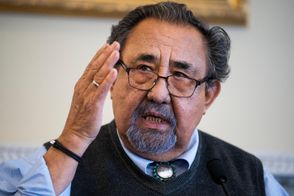Ozturk was arrested by plainclothes immigration agents, some of whom wore masks, outside her apartment in Somerville, Massachusetts late last month—days after her student visa was revoked without her knowledge.
She is one of hundreds of international students who have been targeted by the U.S. State Department's "catch and revoke" program aimed at revoking visas and green cards of students who have been involved in pro-Palestinian protests.
Ozturk wrote an op-ed for her university newspaper last year calling on administrators to "acknowledge the Palestinian genocide" being committed by Israel with U.S. backing and to divest from companies with ties to Israel. The Tufts Community Union Senate had made the same demand.
In court documents the Trump administration has said Ozturk has been "involved in associations that 'may undermine U.S. foreign policy by creating a hostile environment for Jewish students and indicating support for a designated terrorist organization,'" suggesting support for Hamas—but officials have presented no evidence of such support.
Numerous Jewish scholars and organizers have spoken out against the administration's "weaponization" of concerns about antisemitism to oppress groups and individuals who have spoken out against Israel's U.S.-backed assault on Gaza.
Ahead of the ruling on Friday, Massachusetts Democratic Sens. Elizabeth Warren and Ed Markey and Rep. Ayanna Pressley demanded that Secretary of State Marco Rubio release an internal memo on Ozturk's arrest and any other documentation about the administration's case against her.
"Ms. Ozturk's case demands transparency," wrote the lawmakers. "The circumstances of her arrest and detention raise serious concerns about civil liberties, academic freedom, and free speech, as well as the Trump administration's truthfulness. Congress, universities, legal experts, and other members of the public have a strong and compelling interest in the matter.
"Nobody should be shipped to a detention facility halfway across the country for writing an op-ed."
Ozturk filed a lawsuit challenging her detention in Massachusetts, where a U.S. district judge transferred the case to Vermont and denied a government request to transfer it to Louisiana.
Due to the "significant constitutional concerns" raised by Ozturk, Sessions said the court "denies the government's request to dismiss the petition and orders that Ms. Ozturk be transferred to custody within the District of Vermont pending further hearings on this matter."
He said Ozturk should be transferred by May 1 and stayed the order to four days to allow for an appeal.
Ozturk was denied bond this week by an immigration judge, as her lawyers filed their request for her transfer. They said the transfer would allow her better communication with her legal team and a doctor. Ozturk has suffered five asthma attacks in the Louisiana detention center where she is being held, they said.
Lia Ernst of the ACLU of Vermont said Friday's ruling correctly affirmed "that the government cannot undermine the justice system and attempt to manipulate a case's jurisdiction by secretly transporting and imprisoning someone over a thousand miles from home."




